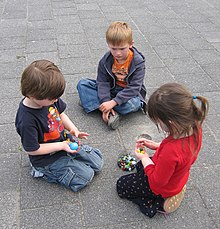Peer group

A peer group is a group of people who are equal in some way. Those in a peer group have the same status and are about the same age. They often interact with the group as a whole.[1] Members of a peer group often have similar interests and backgrounds.[2]
Developmental psychology
[change | change source]Developmental psychologists, Lev Vygotsky, Jean Piaget, Erik Erikson, and Harry Stack Sullivan, argued that peer relationships are important in a person's development, and teach about equality, reciprocity, cooperation, and intimacy. Modern research also shows that social and emotional gains are indeed provided by peer interaction.[3]
Judith Rich Harris, in The Nurture Assumption, argues that an individual's peer group significantly influences their intellectual and personal development. Several long-term studies also claim that peer groups improve school work.[4][5][6]
Related pages
[change | change source]References
[change | change source]- ↑ "Peer group definition". encarta.msn.com. Archived from the original on 13 September 2009. Retrieved 25 November 2010.
- ↑ Wolf, Sun. (2008). Peer groups: expanding our study of small group communication. Thousand oaks,CA: Sage publications, Inc. ISBN 978-1-4129-2686-7
- ↑ Siegler, Robert (2006). How Children Develop, Exploring Child Develop Student Media Tool Kit & Scientific American Reader to Accompany How Children Develop. New York: Worth Publishers. ISBN 0716761130
- ↑ Kindermann, Thomas A (1993). "Natural peer groups as contexts for individual development: The case of children's motivation in school". 29 (6): 970–977.
{{cite journal}}: Cite journal requires|journal=(help) - ↑ Sacerdote, Bruce (2001). "Peer Effects With Random Assignment: Results For Dartmouth Roommates".
{{cite journal}}: Cite journal requires|journal=(help) - ↑ Robertson, Donald; Symons, James (2003). "Do Peer Groups Matter? Peer Group versus Schooling Effects on Academic Attainment". 70: 31–53. SSRN 388214.
{{cite journal}}: Cite journal requires|journal=(help)CS1 maint: multiple names: authors list (link)

